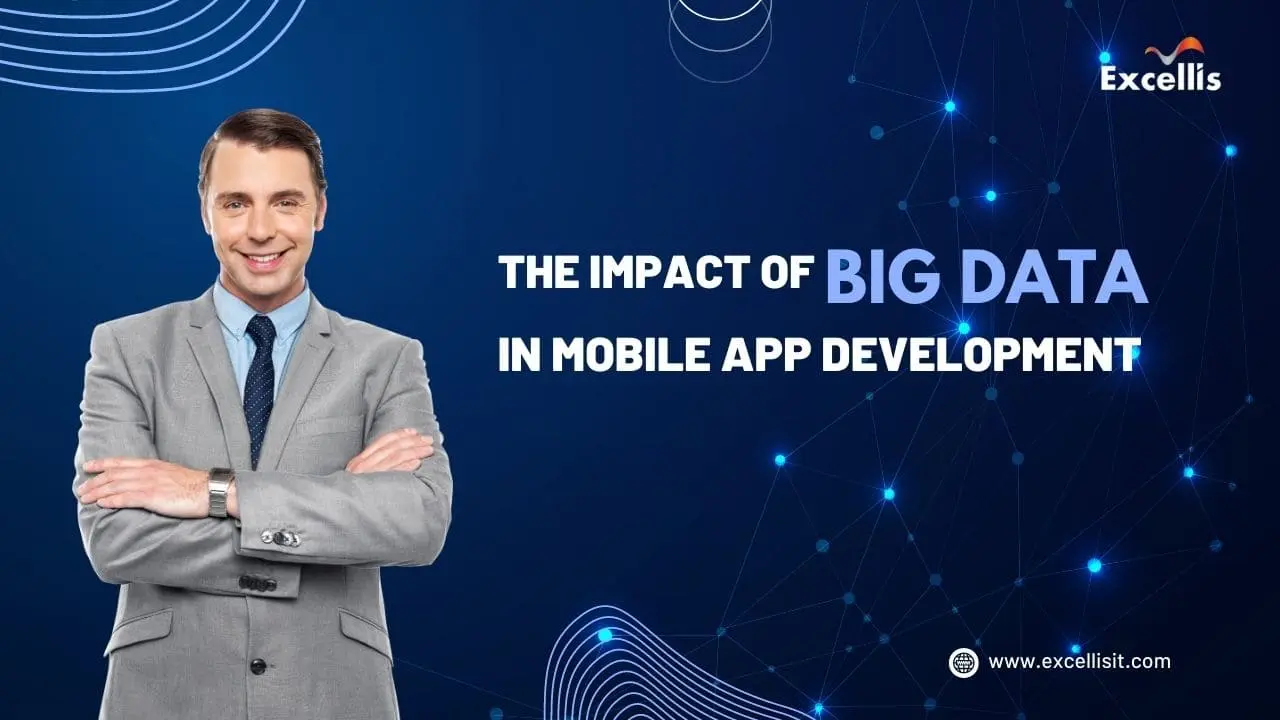
Since the use of mobile apps is exponentially increasing in several industries and businesses, they derive massive volumes of data. Thus, big data plays a crucial role in enhancing the performance, functionality, and user experience of mobile applications.
Especially in the digital era of the 21st century, the utilization and impact of big data is becoming increasingly prevalent in mobile app development.
Further, we will explore the impact of big data on mobile app development.
So, let’s get started!
Table of context
What Makes Big Data a Significant Factor in Mobile App Development?
What is Big Data?
Before delving into the impact of big data in mobile app development, it is essential to understand what big data actually means. Big data refers to the massive volumes of structured and unstructured data that organizations collect on a daily basis. This data is typically characterized by its high velocity, volume, and variety. Big data encompasses information from various sources, including social media platforms, sensors, user-generated content, and more. To make sense of this vast amount of data, advanced analytical techniques and tools are employed.
Here are some top international brands that have utilized Big Data to bring significant operational boosts to their organization:
- Netflix
- Walmart
- Capital One
- Amazon
- American Express
- British Airways
- Starbucks
How Does Big Data Work?
To fully grasp the impact of big data in mobile app development, it is important to comprehend the underlying processes involved. Big data work involves several key stages, including data collection, integration, handling, and analysis.
-
Data Collection
Data collection is the initial step in big data processing. It involves gathering data from various sources, such as user interactions, transactions, social media platforms, and IoT devices. Mobile apps are a major source of data collection, as they generate massive amounts of user-related information, including app usage patterns, preferences, and behaviors.
-
Integration
Once data is collected, it needs to be integrated into a central repository or data lake. The integration enables the consolidation of data from diverse sources, ensuring its accessibility for analysis. Through data integration, mobile app developers gain a comprehensive view of user activities, allowing for better insights and decision-making.
-
Data Handling
Data handling involves the management and preparation of collected data for analysis. This includes data cleaning, transformation, and organization. It is crucial to ensure data quality and reliability before proceeding to the analysis stage. Data handling techniques, such as data normalization and data deduplication, are employed to enhance the accuracy and consistency of the data.
-
Analysis
The final stage in the big data process is analysis. It involves applying advanced analytical techniques to extract valuable insights and patterns from the collected data. Various techniques, such as data mining, machine learning, and predictive analytics, are used to uncover hidden correlations and trends. The analysis of big data enables mobile app developers to make informed decisions and implement improvements to enhance user experiences.
Four V’s of Big Data
The impact of big data in mobile app development can be understood through the lens of the four V’s: volume, velocity, variety, and veracity.
-
Volume
The volume of data generated by mobile apps is enormous. With millions of users and their interactions being recorded, the amount of data collected can quickly become overwhelming. Big data technologies enable mobile app developers to handle and process this massive volume of data efficiently.
-
Velocity
Mobile apps generate data in real time. Users are constantly interacting with apps, generating streams of data that need to be processed and analyzed promptly. Big data solutions provide the necessary tools and infrastructure to handle the high velocity of data flow, allowing developers to derive insights and take immediate action.
-
Variety
Mobile app data comes in various formats and structures. It includes text, images, videos, sensor data, and more. Big data technologies are designed to handle diverse data types and structures, ensuring the integration and analysis of information from different sources.
-
Veracity
Veracity refers to the quality and reliability of the data. Mobile app data may contain inaccuracies, errors, or inconsistencies. Big data solutions offer mechanisms to verify and validate the data, ensuring its accuracy and credibility. By dealing with data veracity, developers can make more reliable decisions and create robust mobile applications.
What Makes Big Data a Significant Factor in Mobile App Development?
As the usage of mobile devices continues to soar and user expectations reach new heights, developers face the challenge of delivering highly tailored experiences that cater to individual preferences and behaviors.
This is where big data steps in as a game-changer, empowering mobile app developers with the ability to analyze vast amounts of information, uncover patterns, and leverage data-driven decision-making to shape the future of app development.
Check out the significance of Big Data in mobile app development below:
-
Understanding Client Requirements
Big data plays a crucial role in understanding client requirements in mobile app development. By analyzing user interactions, preferences, and feedback, developers gain valuable insights into what features and functionalities are most desired. This enables them to create customized mobile apps that meet client expectations and deliver a superior user experience.
-
Understanding the Audience
Big data analytics helps mobile app developers gain a deep understanding of their target audience. By analyzing demographic data, user behavior patterns, and social media interactions, developers can tailor their apps to specific user segments. This understanding allows for more effective marketing strategies and user engagement, leading to increased app adoption and retention rates.
-
Social Media Analytics
Social media platforms generate a wealth of data that can be leveraged in mobile app development. Big data analytics enables developers to monitor social media conversations and sentiment analysis. By understanding user opinions, trends, and preferences, developers can adapt their apps to meet evolving market demands and provide a more personalized user experience.
-
Conversion of Sales
Big data analytics facilitates the identification of key factors that influence user conversion rates within mobile apps. By analyzing user behavior, purchase history, and product preferences, developers can optimize their apps to enhance the conversion of sales. This includes implementing personalized recommendations, targeted advertising, and pricing strategies that resonate with users.
-
Personalization
Personalization is a significant factor that a mobile app development company adopts for mobile app success. Big data enables developers to create personalized experiences by analyzing user data and behavior. This includes tailoring content, recommendations, and notifications to match individual preferences and needs. Personalization enhances user engagement and satisfaction, leading to increased app usage and customer loyalty.
-
Connected Devices
The rise of the Internet of Things (IoT) has resulted in a proliferation of connected devices. Big data analytics allows mobile app developers to integrate data from these devices and create innovative applications. By analyzing data generated by IoT devices, such as wearables or smart home devices, developers can enhance app functionalities and provide users with seamless and connected experiences.
-
User Experience Analysis
Big data analysis provides valuable insights into user experiences within mobile apps. By tracking user interactions, app usage patterns, and performance metrics, developers can identify areas for improvement. This includes optimizing app navigation, reducing loading times, and eliminating usability issues, resulting in an enhanced user experience.
-
Real-Time Data Availability
Big Data helps companies build premium mobile app development services for their clients. One of the most significant impacts of big data in mobile app development is real-time data availability. With big data technologies, developers can analyze data as it is generated, enabling them to make immediate decisions and take proactive actions. Real-time data availability enhances the responsiveness and agility of mobile apps, ensuring a seamless user experience.
-
Customized Marketing Campaigns
Big data analysis allows for the creation of customized marketing campaigns within mobile apps. By leveraging user data, developers can tailor marketing messages, offers, and promotions to individual users. This targeted approach increases the effectiveness of marketing campaigns, leading to higher user engagement and conversion rates.
Finishing it up
In conclusion, big data has revolutionized the field of mobile app development. Its impact is felt across various stages, from understanding client requirements to creating personalized experiences and optimizing app performance. By leveraging the four V’s of big data, mobile app developers can harness the vast amounts of data generated by apps and transform it into valuable insights and actions. With the continuous advancement of big data technologies, the impact on mobile app development is only expected to grow, leading to more innovative, user-centric, and successful applications in the future.
More reasons to trust us!
Excellis IT is building a skilled team in IT support, customer support, digital marketing, and back-office services for modern companies.

Excellis it is an esteemed ISO/IEC 27001:2022 certified company

We achieved the prestigious certification by MSME in 2019

We are certified by the Central Vigilance Commission

We are an honoured members of NASSCOM since 2022






